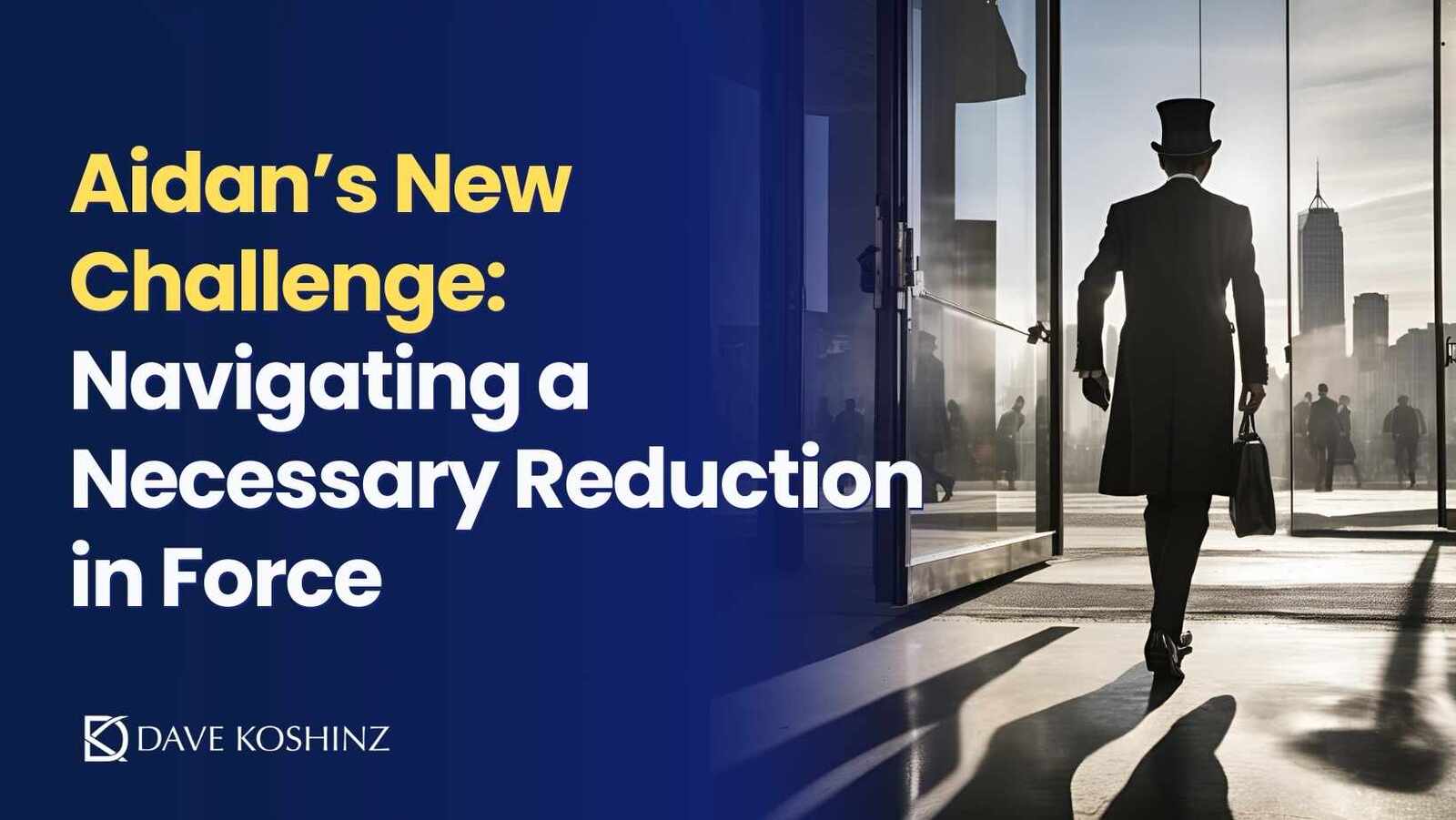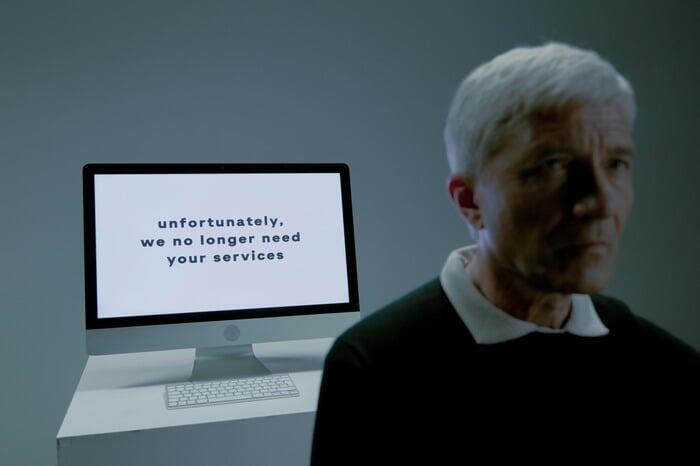
Market Disruption and a Grim Mandate
Just as Aidan was starting to feel a steady rhythm in his leadership—his team was performing well, morale was high—a market disruption hit NovaForge hard. In an emergency meeting, Aidan’s boss informed him that three positions from Aidan’s team must be cut by the end of the week. No alternative. Aidan’s heart sank.

Everyone on his team felt like family, he loved their quirks and rooted for their aspirations. Each employee was fully engaged, delivering value, and trying to weather the storm as best as they could.
Defining Priorities Amid Chaos
First he took some time alone to settle down from the shock, get centered, and make a simple plan on supporting himself through the difficult task ahead. He knew this would be better for everyone if he stayed in balance and made thoughtful steps.
Aidan’s first step was to revisit the team’s key projects with his boss. Which deliverables absolutely had to be maintained given a smaller workforce? Which timelines were flexible? In a flurry of discussions, they hammered out a rough wireframe of revised priorities and deadlines—enough for Aidan to understand where he could afford to lose capacity (as painful as that sounded).
The conversation was rushed; the entire company felt the same pressure. Deadlines loomed, and HR needed names fast to initiate exit procedures. Aidan left the meeting with only a partial picture, but it would have to suffice.
Identifying the Five Possible Cuts
Back at his desk, Aidan laid out the new priorities and matched them against team member roles, skill sets, and project involvements. Whose specialized knowledge would still be most vital? Who could the team realistically manage without? This was no reflection on anyone’s competence; every member still had plenty to contribute.
Narrowing the pool to five likely candidates was excruciating. He kept asking himself:
Who will be most aligned to the upswing when the market recovers?
Who can be resilient if things continue to deteriorate?
How do I honor the commitment and longevity of team members who have given so much?
Each of the five was valuable. Each had personal circumstances—families, mortgages, or student debts. Aidan’s empathy wrestled with the stark reality: He had to choose three to let go.
He remembered words from his former mentor, Marisol:
“Leadership does not mean you don’t feel pain. It means you do what must be done with compassion and clarity.”
Making the Final Decision
After hours of reflection—and a few restless nights—Aidan made the call. The final three were those he reluctantly determined the team could manage without at least short-term, taking into account both project priorities and future needs. Yet it was more than a spreadsheet calculation. He carried the weight of knowing that his choice would uproot three dedicated people.
“I can’t let my guilt paralyze me,”he told himself. “I’ll do my best to support these colleagues through this transition.”
Delivering the News: The 1:1 Meetings
The day arrived. Aidan had coordinated with IT for deactivations, set up final payroll notifications with HR, and prepared the severance information. Now the hardest part—meeting each of the three individuals in private. He wanted to be clear, kind, and as supportive as possible.
Meeting 1: Clarity and Compassion
Aidan invited Charles (a skilled front-end developer) into a small conference room. Heart pounding, he began:
Aidan: “Charles, I want to start by saying how much I appreciate your contributions. You’ve built an incredible user interface that our clients really love.
Unfortunately, I have some difficult news. Because of the market disruption, NovaForge is facing a reduction in force. Your position is among those we can no longer maintain.”
Charles’s eyes welled with shock, then flickered with anger.
Aidan: “I understand this news can feel sudden and unfair. I wish it weren’t happening. I want you to know this decision isn’t about your performance. Our projects have been re-scoped, and we no longer have the budget to support all roles. We value everything you’ve done here. You’ll receive a severance package, and HR will provide more details on extended benefits and resources.”
He paused, letting Charles process. He offered a hand on the table—not physically touching but as a sign of empathy.
Aidan: “I’m here to answer any questions you have. I’ll also be available in the coming days if you want to talk through next steps, or even if you just need a reference down the line. I’d be glad to share how strong your work has been on every project.”
Charles nodded, his voice shaky. “Thanks for being upfront. It’s just hard to take in.”
Aidan: “I understand. Take the time you need. You’ve got my number if something comes up after today.”
Meeting 2: Acknowledgment of Service and Future
Next up, Selena, a longtime QA specialist who’d helped unify testing protocols.
Aidan: “Selena, I want to express my deepest gratitude for the way you’ve standardized our testing. Your work has made a huge difference in quality assurance here. Unfortunately, I have to share that we’re reducing staff, and your role is impacted.”
Selena’s shoulders slumped. She’d been at NovaForge even longer than Aidan and had seen multiple reorganizations. Her eyes reflected both hurt and resignation.
Aidan: “I know how committed you’ve been. This is not about your contribution; it’s about the financial realities forcing us to cut essential roles. I’m so sorry—it was a painful decision. I want to ensure you have all the support and resources we can give you, including severance and assistance from HR in transitioning.”
He slid a folder across the table.
Aidan: “Everything is in here—details about severance, healthcare extensions, and job placement services. I’m also more than willing to write a letter of recommendation or speak on your behalf anytime.”
Selena blinked back tears. “I’ve been through layoffs before, but it never gets easier.”
Aidan: “I know. Your work here has been invaluable. I hate that it has to end this way. But please remember, this door closing isn’t a reflection of your skill or character. I believe you’ll land somewhere that truly appreciates what you bring.”
Meeting 3: Emphasizing Support and Ongoing Connection
Finally, Ravi, a junior developer brimming with potential. Aidan had watched him grow from an intern into a confident contributor.
Aidan: “Ravi, this is tough for me to say, but your role is one of those affected by the reduction in force. It’s not about your performance—you’ve grown so much and done everything the team needed. But given the project scope changes, we can’t sustain your position right now.”
Ravi looked stricken. He’d only recently signed a lease on a new apartment.
Aidan: “I know this impacts you in a big way, and I’m truly sorry. I wish circumstances were different. I’ve arranged for severance to help bridge this period. And if you’d like, I’ll reach out to my network and see if there are other opportunities that match your skill set.”
Ravi managed a tight smile. “That would mean a lot. I was just starting to find my stride here.”
Aidan: “You really have. This isn’t a reflection on you. Please keep in touch. I’m here for any guidance—even if it’s just reviewing your résumé or prepping for interviews.”
Aftermath: Holding Space for Grief and Moving Forward
Once the three difficult conversations were done, Aidan felt emotionally drained. It was only midday, but it felt like weeks had passed. He went back to his desk, took a deep breath, and quietly closed his office door for a moment of reflection.
He remembered a quote from Brené Brown that Marisol had often referenced:
“Clear is kind. Unclear is unkind.”
Aidan had lived that philosophy today, ensuring he was direct but empathetic, leaving no one with doubts about why this was happening or how the organization would support them on the way out.
He also checked in with his remaining team members, who were understandably anxious about the news. In a brief meeting, he explained the layoffs weren’t performance-related, but strictly a matter of budget constraints and project scope. He offered to be available for any concerns or emotional support. Transparency was his shield against rumor and fear.
Still, sadness hung in the air.Aiden recognized that grief is natural in any major loss—especially in a tight-knit team. He reminded everyone:
“We’re still in this together, and we owe it to those who are leaving to keep delivering quality work they’d be proud of. Their contribution is part of our DNA, even if they’re not here physically.”
Reflection and Leadership Growth
Over the next few days, Aidan made himself available to Charles, Selena, and Ravi for final handovers. He confirmed recommendations and references. When goodbyes were said, each departed with a mixture of sadness and gratitude that at least the process had been handled with dignity.
In the quiet that followed, Aidan couldn’t help but feel the weight of it all. But he also knew leadership sometimes requires painful decisions. By staying true to core values—respect, empathy, and clarity—he’d done his best to minimize harm. The experience reaffirmed the complexities of leading humans, not just processes.
“I walked into this role thinking about software problems. Today, I had to make decisions that changed people’s lives. It doesn’t get more real than that.”
And so, Aidan continues his hero’s journey, navigating another “cave” he feared to enter: the realm of necessary but heartbreaking layoffs. The treasure he discovered wasn’t something he could celebrate—rather, it was a deeper sense of responsibility and compassion.
The lesson?
Even in moments of great difficulty, remaining clear, empathetic, and present is the mark of a leader who refuses to hide from the human dimension of business.

